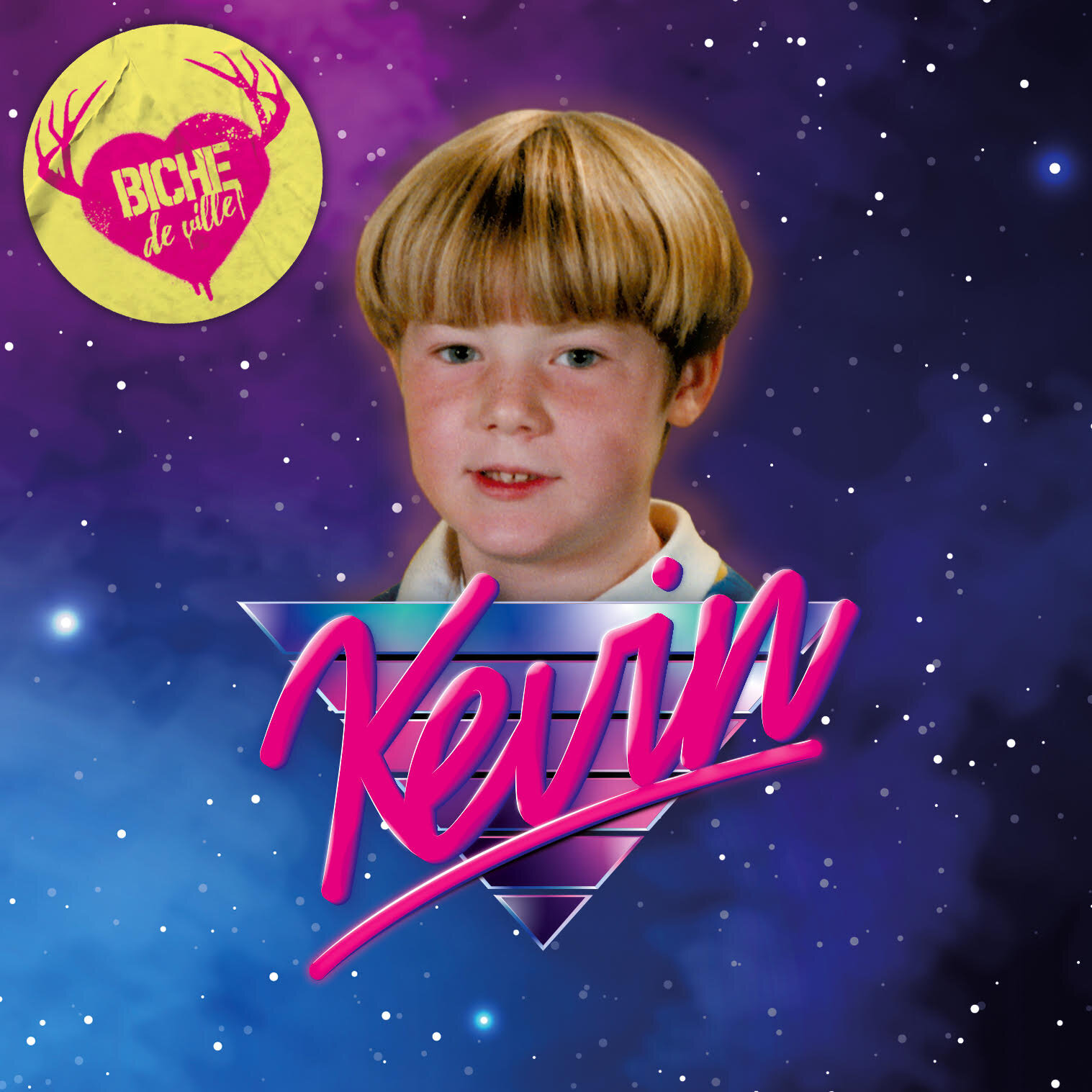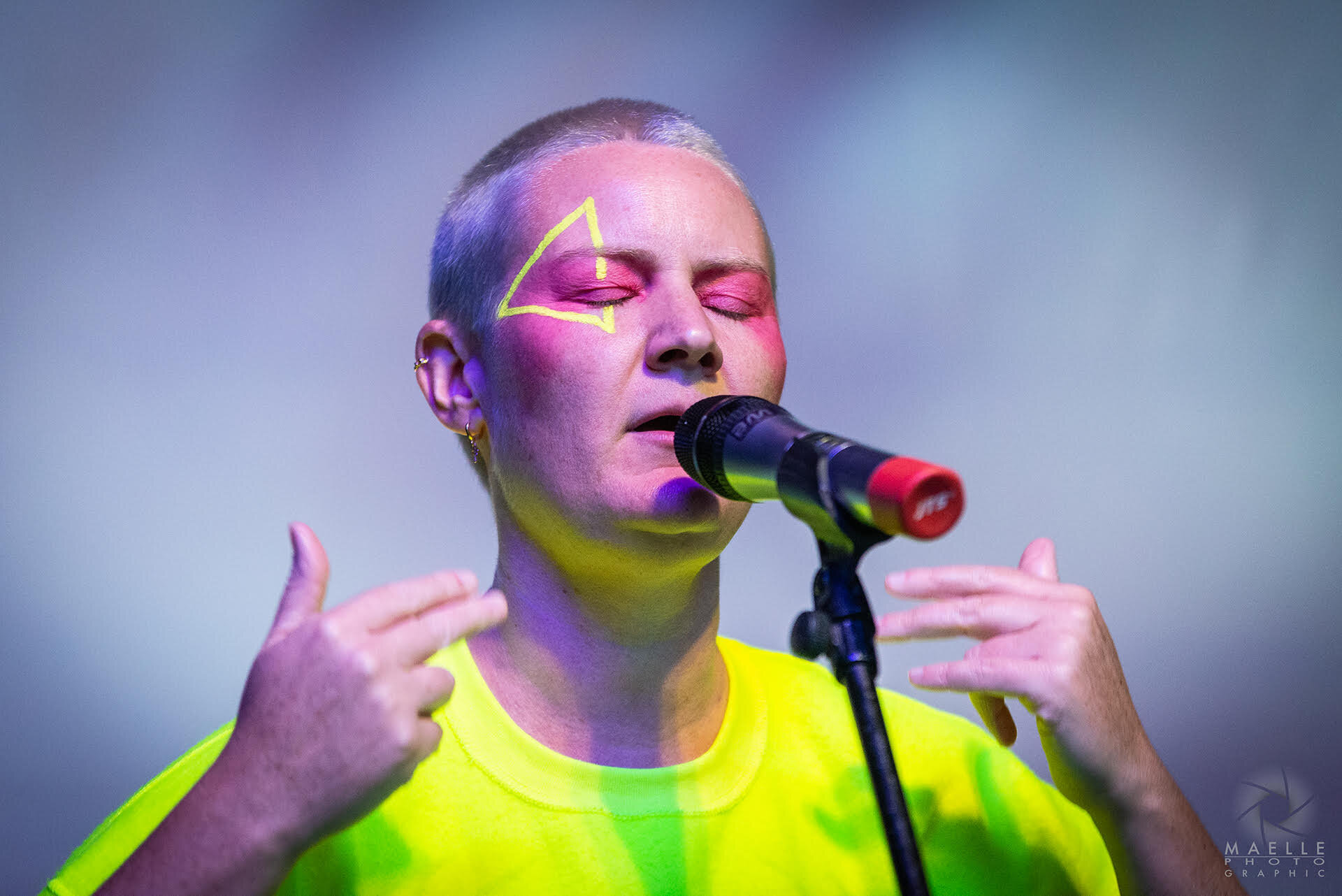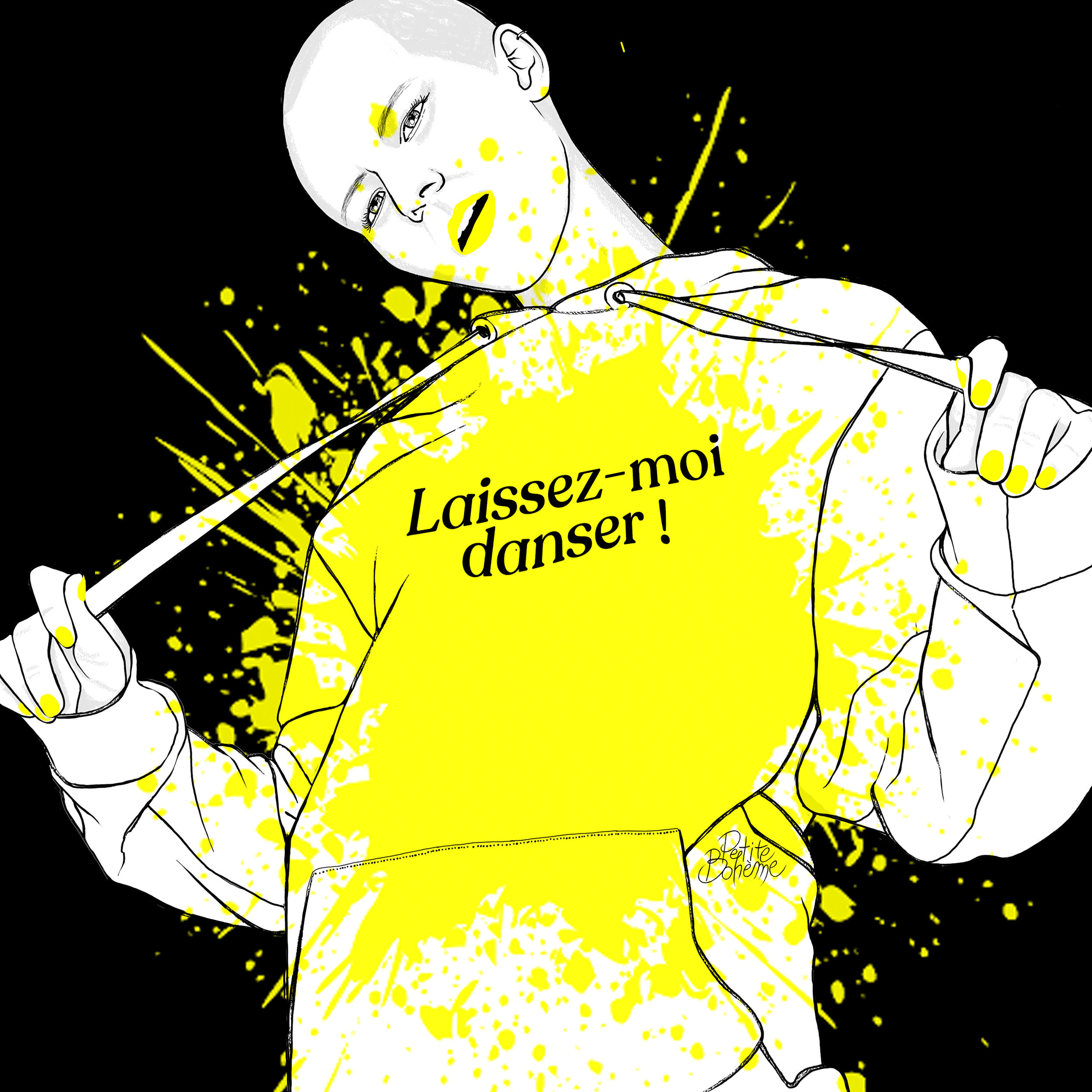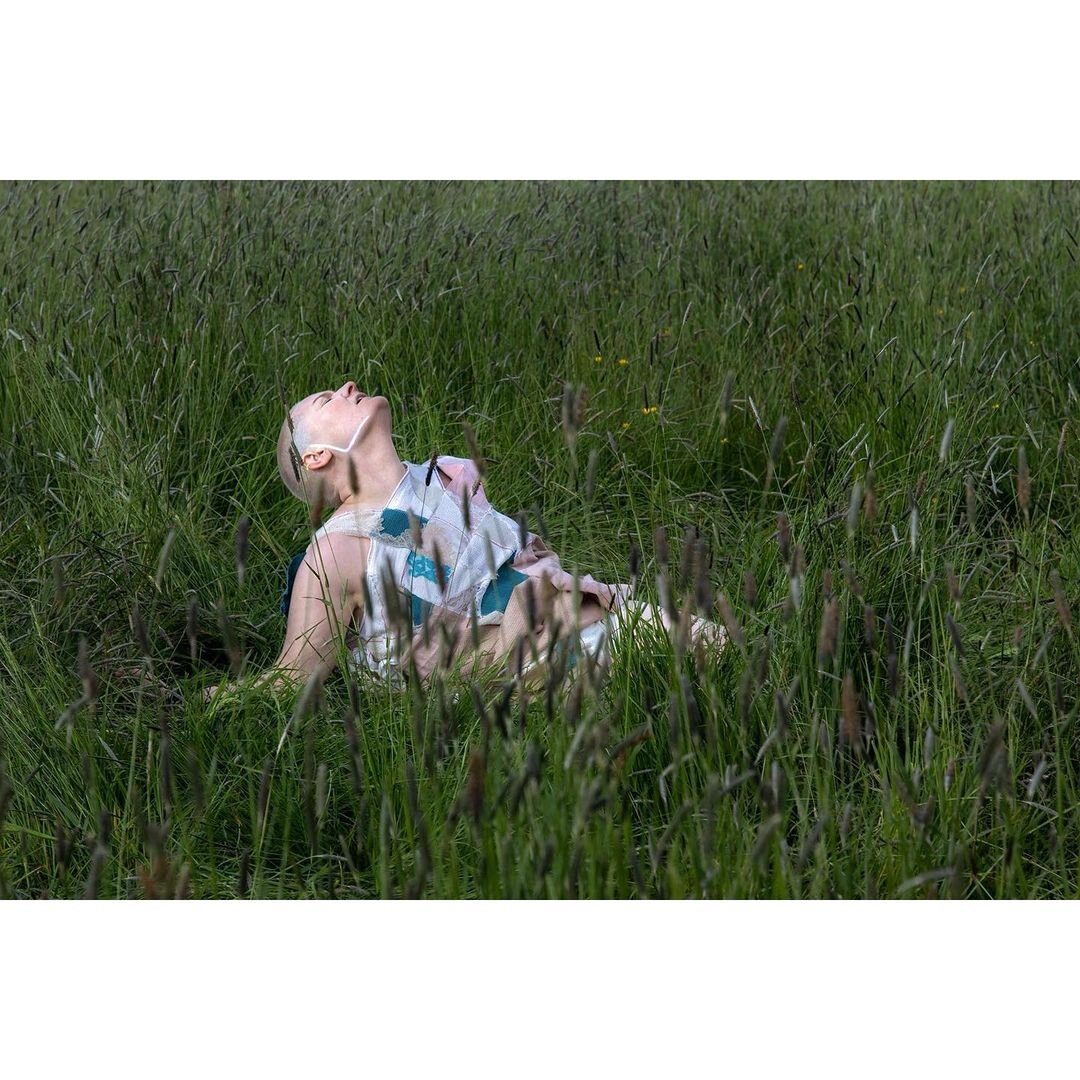
Biche de Ville
Hi Biche! We’re very happy to interview you. Could you tell us a little bit about yourself as an artist?
Biche de Ville: “I’m a punk poet. I write out loud what you feel inside yourself. I create to make sense of what’s inside my heart. That’s how I define my art. I do that with my words, my music, and with film. The last time I acted in and produced a movie was a long time ago, though.
« Veux Moi » was shown on the Porn Film Festival Berlin and at a lesbian and porn platform in San Francisco. Which is funny, because that film is not about lesbians nor about porn (laughs). It’s just about women’s sexuality.”
“However, when I’m on stage, I always have short films behind me. For me, it’s a different way to show and touch people. Not everyone is susceptible in the same sense. That’s why I use different formats like music, words, film and dance to try and reach the heart of the person in front of me. It’s funny because someone from Thailand recently told me: “I really understood your song. I don’t know the words, I don’t know what it means, but somehow I feel the same!” That’s a victory to me! (laughs).”
Recently, you’ve released your first album ‘Kevin’… How was that?
“Oh my god. I put everything I have into it. All my feelings… You know, when I began the album, I didn’t know it was the beginning of an album. Two years ago, I started writing and making music, because I wanted to express myself. Someone mocked me for who I am and it made me realize I don’t want to listen to what others think of me… I want to make what I want to, and be who I am.”
“Over those two years, I gradually made my way through the album. I wrote a song and would feel like it made a nice addition. And when I first heard the finished version of GMMS, I immediately thought: “If I ever put an album out, this will be the single of that album.”
“The title of the album, ‘Kevin’, only came about a year ago. During my concerts I would always tell the little story of ‘Kevin’: one day when I came home from school, when I was seven, I told my mom: “You have to cut my hair in a bowl cut, I want a sweatshirt with a cowboy on it, and please call me Kevin.”
“About a year ago, I realized ‘Kevin’ is not just a silly childhood joke I would tell during my concerts. It’s a lot more than that. I realized it’s the truth about me. Kevin is me. I chose ‘Kevin’ as the album title, because at that time I was coming to terms with my trans identity. I think people don’t realize it’s me on the cover of the album, but it’s me!”
“I’m not only that, though. Some people call me Kevin now, but I’m not Kevin. I am the person I am today, and Kevin is only a part of that. My partner, who is a graphic designer, created the cover picture I use on social media. I think it explains this mix very well.”
“For example, on the album I also have songs from when I was a teenager and in my twenties. Mamie est dans une boîte tells the story of who I was at 20 years. And Eva Mega Bonne… is me a few years ago, when I was a performer at techno parties with red boots and long blonde hair and very open to sex. I was very different then, but it’s a part of me. I wanted to show these songs and stories on the album too. That’s the nice thing of not having a producer sometimes, you can include ALL the songs you want (laughs).”
“The album is one big story – all my stories from ‘Kevin’ up to today. Now it’s time for me to move forward and create for the person I am now and who I will be in the future.”
Beside the stories, where there specific topics or themes you really wanted to include on the album?
“Yeah, there are a lot of topics that really touch my heart, and when I really care about something, I need to write about it. It’s instinctive, because if it hurts me, and I feel the need to talk about it, then maybe other people feel the same and it hurts them too.”
“Some songs started out like that. I decided to write RIDES [a song about beauty standards and the negative judgment of older bodies], because I really needed to get it off my chest. The same with Ma terre a mal… I had been watching a lot of documentaries on ecology, and I wanted to find words for those concerns. And when I was ready to talk about my experience, I wrote Mon sexe, ma bataille.
”I’m not sure I’m a singer and I’m not sure I’m a composer, but I’m sure I can make art with humility.”
Is it a conscious choice to use electronic music?
“It is. I like electronic music and I like to dance and party. It was my dream to make people dance, because if you dance together… there’s this vibe of “we’re all the same, we’re all together and everything is going to be alright”.”
“Also, I’m not a schooled musician (laughs). For me it’s the easiest way to compose. That’s the thing… I work really hard and I’m very passionate about this. I can do a lot of things, but I’m not perfect at them. Like, I’m not sure I’m a singer and I’m not sure I’m a composer, but I’m sure I can make art with humility.”
That’s a great way of looking at it. You make a lot of your art by yourself. Do you feel like you need complete creative control?
“I do that because sometimes I don’t have a choice. I want to create a lot, and I’m not very patient (laughs). I searched for a musician for many years, and sometimes you just have to be like: ‘Okay, if I can’t find someone, I will just do this myself’. But I like to collaborate and share. Collaboration can be very good if you find the right people.”
Is there a particular artist you really want to collaborate with?
“Yes, I want to work with Jan Wallyn. It’s funny because Jan and I met 15 years ago. I was an actor in a video clip, and they were a make-up artist. They did my make-up, and it was just such a great vibe. We didn’t see each other after that, but we follow each other on social media. It is thanks to them I discovered I’m non-binary.”
“I saw their coming out in a story on Instagram and I recognized myself in it. It’s since that time that we inspire each other. When they told me the story behind their new show ‘About the hottest chick in town’, I realized it was the same as my ‘Kevin’-story. We even had the same hair as my album cover!”
At the start of our interview, you introduced yourself as a ‘punk poet’ – tell us about that.
“Ah, in the beginning I called my art ‘pop poetry’. I didn’t know what my real style of music was, and I was doing something different from most people, so I felt like ‘pop’ was a term everyone could relate to. It’s something everyone can understand.”
“But just like me, my project evolved. One day someone presented me as a ‘punk poet’ and it just clicked. The word described what was already inside of me, because ‘punk’ is not a kind of music, it’s a way of doing things. I don’t wait until I’m ready to do something. I just do it, because I need to express myself.”
It seems like your journey with ‘punk poet’ relates to being able to identify more closely with who you are as a human and finding the right words for that.
“Yeah, it’s hard to define yourself when you don’t have a role model. It was the same with my trans identity and with my music… I wanted to see someone my age on stage and speak about their experience. But I didn’t find any role models like that. It comes to a point where you’re like: ‘Okay, if I don’t see it anywhere, maybe I can be what I want to see.”
“But within the music industry, it’s hard to do that sometimes. I’m different and that doesn’t always serve you well.”
“It’s not because I came out late, that I’m not valid.”
Have you experienced any discrimination or prejudice within the industry?
“When I started out, it was more about my age. But since my coming out, the reaction has often been that I’m not queer enough to represent the queer scene. It’s not because I came out late, that I’m not valid.”
What does it mean to not be queer enough? Isn’t ‘queer’ supposed to break down all of those constructs?
“Yeah, but they build new categories. Now it’s like: ‘trans people are this, and non-binary people are that’. No! Non-binary is to be outside the box. Not a new box!'“
“ I had surgery on my torso, but only reduced the mass. That’s a little different. And I remembered I cried in front of the mirror after my operation, because I didn’t see this kind of non-binary representation anywhere. I started to think maybe I didn’t have the right operation. I do it my own way, but sometimes it’s difficult when there’s not a lot of representation of various trans identities. There are many ways to be trans, not one way. But if you don’t see people who look like you, if there’s no representation, you can start to think that you’re not the right way.”
“The representation of non-binary and trans identities – we don’t talk enough about it. Not with enough honesty. Because even if you’ve figured out who you are and you feel right, some days it still hurts and is hard to feel okay. It takes time. And we can’t talk about that, because we live in a society where body positivity and a positive mindset are everything. It’s hard to only be positive.”
It’s okay to sometimes not be okay. It can take the pressure off not having to be perfect.
“Yeah, and particularly in the trans way. The only thing we show is: ‘I came out and an operation, and now I feel so much better’. That’s not true. It’s not magic. It takes time to feel better and feel good in front of your mirror, maybe even months or years.”
“I talked about this with a therapist at genres pluriels and she told me I’m not alone in this. That those feelings are allowed. Trans people need to hear this and realize that’s okay. We need to share those experiences and feelings too. I think that’s why it’s important for me to speak about my journey… Someone else might recognize themselves in it and feel less alone. To see someone who looks like you or is experiencing the same thing as what is happening inside of you, that’s precious!”
You’re an engaged artist. Do you think of your art as a form of activism?
“Hmm… I don’t know. I do think it’s important to have a message, because as an artist you have a voice and people listen to you. Of course, you can just make something that is beautiful, but that’s not necessarily what I do. It’s my mission to express what people are feeling inside. That’s not always beautiful. In my art, I talk a lot about things that are not happy, but it’s life, it’s authentic. We need that authenticity.
“Recently, I received a comment on my GMMS video saying: ‘This is the wrong way to express yourself and your disabilities’. But you know, for me it’s the truth. Not THE truth, but my truth. We all have our problems and cry sometimes. I don’t think it’s bad to share that, I think it’s authentic.”
Could you share a little more about the meaning behind your GMMS video?
“There’s two sides to it. In the beginning, I wanted to express what you feel inside when you discover you’re trans and you go to the hospital for surgery. There’s an experience inside you, and there’s an experience outside. Because when you put out a trans identity, it’s the start of the adventure. It’s the beginning, not the end. I wanted people to ask themselves if it was real before too.”
“I was also very touched by conversion therapy. It was during a period in France when it was a public debate, and I wanted to open the conversation on it. Because we don’t realize enough that it is a real problem. It’s not on the opposite side of the planet, it’s here, in our countries. There’s a lot of violence against trans people. I think a lot of people don’t realize that.”
…you could think of society as a huge conversion therapy camp.
“These two sides are parallel in the video. Sometimes we go to hospital by choice – in the case of surgery – but sometimes the hospital is society, because it wants to make us be like everybody else and get rid of differences.
“In that way you could think of society as a huge conversion therapy camp. Maybe it would be even better to say that the image at the end of the video is not just for trans people, but for everyone.”
Do you think there need to be changes within the queer community as well?
“Yeah, we need to open the queer community, because sometimes we recreate the same patterns as in straight culture. Like in the representation of gay men – they need to be very fit, muscled. It’s the same with trans women – they have to be very thin and feminine. But we don’t all look like that.”
“I think the responsibility is on queer people who are creating queer culture to open that spectrum. There’s not one way to be something, there are lot of ways.”
Want to see more of Biche de Ville? Go check out their concert at RainbowHouse Brussels.
